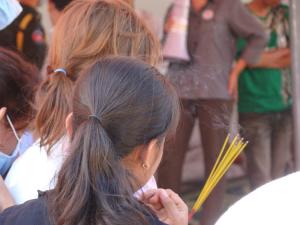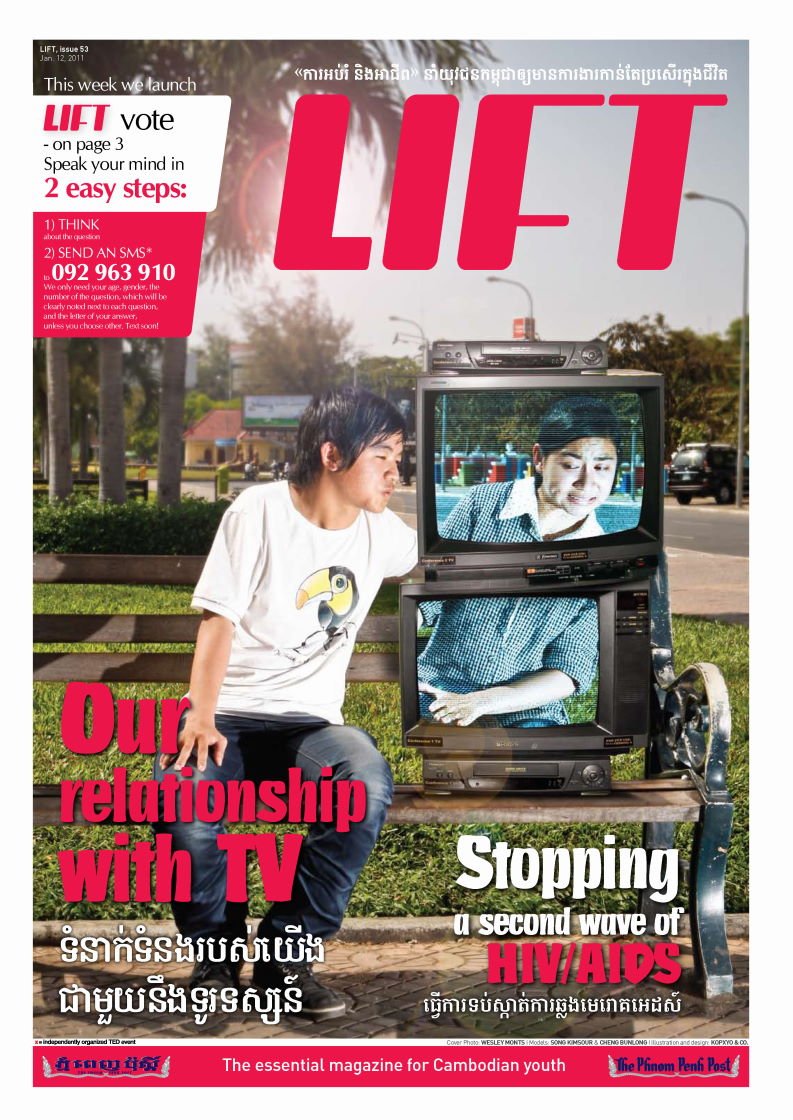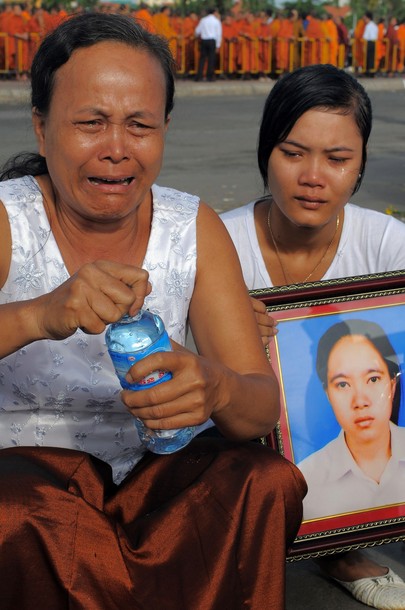[soundcloud width=”100{0a5c1eeb84ccc7c2d601964b33dd4fc73dc6a68f91616e3e53041e90b1033ab3}” height=”81″ params=”show_comments=true&auto_play=false&color=ff7700″ url=”http://api.soundcloud.com/tracks/8309634″] Should authorities be blamed on Koh Pich Issue by saoyuth
My radio production course assigned me to do a commentary with my friend under a topic “Should authorities be blamed on Koh Pich Issue?”. My friend is on an opposing site that he think that the authorities should be blamed while I am on a supporting side that I have to stat that authorities should not be blamed.
We’ve just finished it as a radio course assignment and we’d like to share this piece with all of you. Cheers,

Relatives blessing for the deceased / by: Dara Saoyuth
Cue/Introduction: Diamond bridge stampede claimed some 350 people’s lives and injured hundreds last month, on the last day of water festival. Critics and a number of people have been complaining about the tragic incident. They put blame on the authorities for the reason that they have not managed the event well. However, some people have the ideas that no one should be blamed for the incident.
Our program is going to have commentary on the topic “Should the government be blamed for the incident?” Our commentators Sun Narin and Dara Saoyuth will express their point of view on the issue.
Sun Narin (Opposing site): I could not imagine how such incident happen on that day? People got jammed on the bridge and could not get out. Cambodia’s prime minister Hun Sen said that “Nobody will be punished for the incident.”
However, Sam Rainsy opposition party Son Chhay pushed the ruling government to identify the people responsible for “organizing the festival and handling the crowd” and wanted them to be fired from the position. This includes Phnom Penh governor, head of the police and interior ministry.
In my opinion, the government at least should take actions with those officials because they are irresponsible for their duty.
Phnom Penh municipality, relevant ministry and police did not perform their work responsibly and carefully. Why didn’t police facilitate the people’s crossing the bridge? There is not a lot of police force deploying at the incident place at that time.
Moreover, the bridge is for the exit only, why people were allowed to get in and out? This is the reason causing the mass deaths. Why didn’t police deal with that problem?
Police could not help the victims urgently when the incident happened, keeping people stuck in the crowdedness more than 2 hours. This caused more people dead because of the suffocation in the stampede.
Finally, the organizing people don’t plan the ceremony well. They are not well-prepared to be ready for the unplanned incident. Comparing to other countries, when there is the some special event like that the government must guarantee that the safety for people. They are very careless about this.
I think this is the mass unprecedented deaths, so all these officials should be taken off from the position as the example for the other people.
Dara Saoyuth (Supporting site): Even though most Cambodians can think only who should be blamed when talking about tragedy on Koh Pich, to me, it is an opportunity to learn rather than focus on blame finding.
During the water festival, truck or big cars were not allowed to enter the city and even tuktuk couldn’t drive along riverside to avoid traffic jam and accident. I dared to say that Phnom Penh authorities were well-planned for the festival.
This year, people moved into the city more than the authority expectation, that in the evening of 22 November 2010, the accident happened. There are many reasons causing stampede including the lack of people morality that they push each other back and forth? Why should only authorities be blamed?
As we can see, immediately after the accident, the authorities were trying to help the victims in many ways.
The government ordered the Ministry of Health to pay much attention to the victims and also some officers to send dead people to their provinces with free of charge. The Phnom Penh Capital Hall also started reporting on the tragedy instantly and kept updating with new announcement related to the incident.
No one wants this to happen and also nothing can be changed. Now we should better find the solution instead of blaming.
One facebooker, Samsokrith Chhaly, urges the public to think of those who died during the Water Festival as heroes because they gave us priceless lesson for next year’s preparation. When development sides establish in Cambodia next time, I’m sure that they will think first about an effective risk management system.
Conclusion by Dara Saoyuth:
After listening to both supporting and opposing sides, do you still think that government should be blamed for the tragedy? If yes, what can you get from that? I know that it is Cambodian habit to accuse each other when something bad happen, but I suggest you to be more positive by considering it as a lesson. Again, no one should be blamed. Critics should take the effective risk management system for considering rather than putting blame.
By: Dara Saoyuth & Sun Narin
22/12/2010






